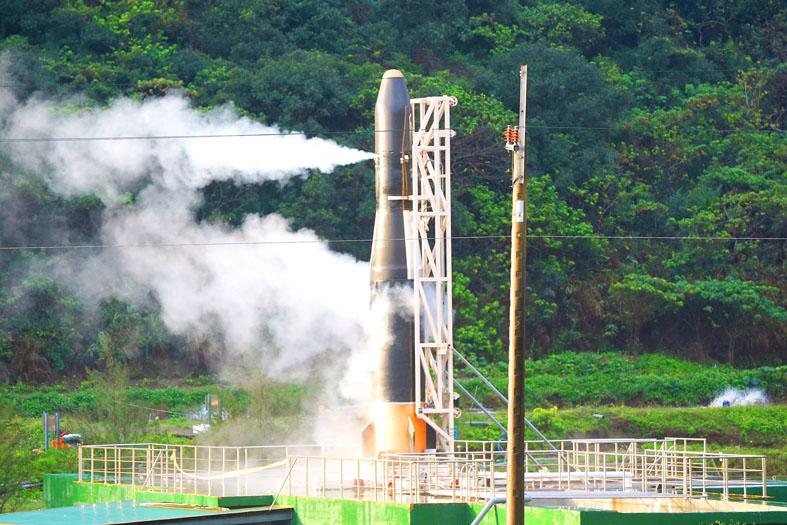The Australian government on Monday said that it had approved an application from Taiwan Innovative Space (TiSPACE) to launch its Hapith I sounding rocket, while the National Space Organization (NSPO) again postponed its launch service contract with the company.
“Taiwanese company TiSPACE will conduct a test flight of its Hapith I — a 10m, two-stage, sub-orbital rocket — from the Whalers Way Orbital Launch Complex, which is operated by Southern Launch,” Australian Minister for Industry, Science and Technology Christian Porter said in a statement. “The date for the launch will be determined by TiSPACE and Southern Launch in the coming months. TiSPACE is also currently considering bringing manufacturing of complete rocket systems to Australia.”
After TiSPACE’s plans to launch the rocket in Taitung County between late 2019 and early last year were suspended due to controversy over the legitimacy of its use of the land, company personnel in February visited Australia to search for launch opportunities, the Taipei Times reported in May.
While TiSPACE has vowed to become Taiwan’s first commercial launch service provider, it has not yet proved its rocket technology.
Aside from demonstrating its launch capability, TiSPACE has to fulfill a contract to launch a scientific payload developed by National Central University (NCU) to an orbit of 150km or higher, a task commissioned by the NSPO in 2016 for about NT$50 million (US$1.79 million at the current exchange rate).
The scientific payload is an ionosphere scintillation package developed by NCU Department of Space Science and Engineering chair Chao Chi-kuang (趙吉光).
Chao’s team plans to visit Australia to collect the scientific data and share it with Australian collaborators, but the NSPO has not yet decided whether to fund the travel expenses, as it is waiting to see if TiSPACE’s first test launch would be a success, Chao said.
TiSPACE on June 29 told the NSPO that it had not obtained the Australian government’s approval for its launch, so the agency agreed to postpone their contract from July 31 to Dec. 31, the NSPO said.
Southern Launch’s Web site shows that there are to be three test launch slots for suborbital flights in the third and fourth quarters of this year, although it does not mention TiSPACE.
Some Taiwanese space enthusiasts have expressed regret that they would not be able to witness the Taiwanese company conduct its first rocket launch.
After TiSPACE’s failure to launch its rocket in Taiwan, it is eager to explore new business opportunities in Australia, a source familiar with the matter told the Taipei Times.
The company, based in Miaoli County’s Jhunan Township (竹南), is still working on rocket-related research and development, but it is also seeking to develop new space applications in Australia, not just launch services, the person said on condition of anonymity.
While it has received more funding from private investors, TiSPACE cannot just exist on projects funded by the NSPO and it is looking for business opportunities in Australia and other nations, the person said.
As of press time last night, the company had not responded to a Taipei Times request for comment.
Following the controversy surrounding TiSPACE’s Taiwan launch plan, the Ministry of Science and Technology announced a plan for a sounding rocket launch site in Pingtung County’s Syuhai Village (旭海).
The 0.97-hectare site would be used for rocket launches on a short-term basis, the NSPO said.
Once the NSPO obtains the consent of local Aboriginal communities, scientists would be able to use the site for rocket testing, it said.
Meanwhile, the ministry is looking for a site to build a launch pad for commercial long-term use, as stipulated by the Space Development Act (太空發展法), and it is drafting regulations to be submitted to the legislature related to the new site, compensation for local residents and a reorganization of the NSPO.
Source: Taipei Times -2021/08/25





















